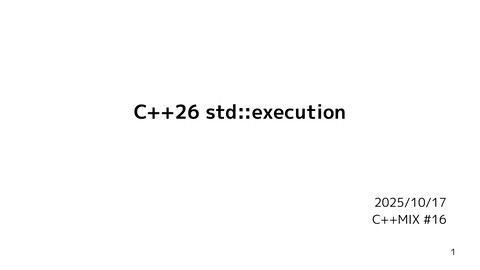nakameguro_feature.cpp vol.8
3.2K Views
March 09, 21
スライド概要
nakameguro_feature.cpp vol.8資料
関連スライド
各ページのテキスト
nakameguro_feature.cpp vol. 8 2018/9/13 yoh(@yohhoy) 1
未承諾広告※ 事前にご一読頂けると、より楽しめると思います。 ● スレッドセーフという幻想と現実 https://yohhoy.hatenablog.jp/entry/2013/12/15/204116 ● メモリモデル?なにそれ?おいしいの? https://yohhoy.hatenablog.jp/entry/2014/12/21/171035 2
おことわり ● 各種ヘッダ#includeは省略 ● using namespace std; ● C++マルチスレッドプログラミングの基礎知識 – ● Mutex, ScopedLock, atomic変数, データ競合(data race) CPU/プロセッサの基礎知識 – キャッシュライン(cache line), キャッシュコヒーレンシ (cache coherence), アウトオブオーダー(OoO)実行 3
もくじ ● scoped_lock<...> ● shared_mutex ● Interference sizes ● atomic::is_always_lock_free ● Deprecate shared_ptr::unique ● Temporarily discourage memory_order_consume 4
もくじ お役立ち情報 ● scoped_lock<...> ● shared_mutex ● Interference sizes ● atomic::is_always_lock_free ● Deprecate shared_ptr::unique ● Temporarily discourage memory_order_consume ヲタク向け 5
scoped_lock<...> 複数ミューテックス対応 ScopedLock ● lock_guard<Mutex>の上位互換 ● ミューテックス型の自動推論 ● デッドロック回避(cf. lockフリー関数) https://wg21.link/p0156r2 Variadic lock_guard (Rev. 5) https://wg21.link/p0739r0 Some improvements to class template argument deduction integration into the standard library 6
scoped_lock<M1> // C++14 // C++17 mutex m; mutex m; { { lock_guard<decltype(m)> lk{m}; /* 共有変数へのアクセス */ } // mを自動unlock scoped_lock lk{m}; /* 共有変数へのアクセス */ } // mを自動unlock 「クラステンプレートのテンプレート引数推論(C++17)」により、 ミューテックス型の明示指定が不要に(明示してもよい)。 7
scoped_lock<M1, M2> mutex m1, m2; thread#1 { thread#2 { lock_guard<mutex> lk1{m1}; lock_guard<mutex> lk2{m2}; lock_guard<mutex> lk2{m2}; lock_guard<mutex> lk1{m1}; /* 共有変数へのアクセス */ /* 共有変数へのアクセス */ } // m1,m2を自動unlock } // m2,m1を自動unlock 8
scoped_lock<M1, M2> mutex m1, m2; thread#1 { thread#2 { lock_guard<mutex> lk1{m1}; lock_guard<mutex> lk2{m2}; lock_guard<mutex> lk2{m2}; lock_guard<mutex> lk1{m1}; /* 共有変数へのアクセス */ /* 共有変数へのアクセス */ } // m1,m2を自動unlock } // m2,m1を自動unlock デッドロック! 9
scoped_lock<M1, M2> // C++14 // C++17 mutex m1, m2; mutex m1, m2; { { lock(m1, m2); scoped_lock lk{m1, m2}; lock_guard<decltype(m1)> /* 共有変数へのアクセス */ lk1{m1, adopt_lock}; } // m1,m2を自動unlock lock_guard<decltype(m2)> lk2{m2, adopt_lock}; /* 共有変数へのアクセス */ } // m1,m2を自動unlock 参考 http://d.hatena.ne.jp/yohhoy/20120919/p1 10ScopedLockクラス比較 lock_guard (C++11) scoped_lock (C++17) unique_lock (C++11) adopt_lock ◯ ◯ ◯ テンプレート 引数推論 ◯ (C++17以降) ◯ ◯ (C++17以降) 遅延Lock TryLock ◯ 条件変数 ◯ 複数Mutex ◯ 11
shared_mutex タイムアウトサポート無し共有ミューテックス ● Readers-Writerロック・セマンティクス ● C++14ライブラリ仕様の補完 (shared_timed_mutexはC++14で追加済み) ● タイムアウト対応版よりも最適な実装(かも) https://wg21.link/n4508 A proposal to add shared_mutex (untimed) (Revision 4) 12
排他/共有ロック 「書込(write)は一人だけ/読取(read)はみんな同時に」 ● ● 排他ロック(Exclusive Lock) – 共有変数へ書き込めるスレッドは1つだけ – 他スレッドからの排他/共有ロック獲得要求をブロック 共有ロック(Shared Lock) – 共有変数から複数スレッドが同時に読み取り可能 – 他スレッドからの共有ロック獲得要求は成功する – 他スレッドからの排他ロック獲得要求をブロック 13
排他/共有ロック int resource; // 共有変数 shared_mutex sm; write_thread#0 { read_thread#1..N { // 排他ロックを獲得 // 共有ロックを獲得 lock_guard wlk{sm}; shared_lock rlk{sm}; // 共有変数への書込み // 共有変数からの読取り resource = 42; int local = resource; } // 排他ロックを解放 } // 共有ロックを解放 14
排他/共有ロック int resource; // 共有変数 shared_mutex sm; write_thread#0 { read_thread#1..N { // 排他ロックを獲得 // 共有ロックを獲得 lock_guard wlk{sm}; shared_lock rlk{sm}; // 共有変数への書込み // 排他ロックじゃないのに resource = 42; // 共有変数へ書き込んだら } // 排他ロックを解放 // どうなるのっと... resource += 1; } // 共有ロックを解放 15
排他/共有ロック int resource; // 共有変数 shared_mutex sm; write_thread#0 { // 排他ロックを獲得 lock_guard wlk{sm}; // 共有変数への書込み resource = 42; } // 排他ロックを解放 read_thread#1..N { // 共有ロックを獲得 データ競合! shared_lock rlk{sm}; // 排他ロックじゃないのに 未定義動作! // 共有変数へ書き込んだら // どうなるのっと... resource += 1; } // 共有ロックを解放 16
標準Mutex一覧 排他 ロック mutex ◯ timed_mutex ◯ 共有 ロック 再帰 ロック タイムアウト サポート ヘッダ ◯ recursive_ mutex ◯ ◯ recursive_ timed_mutex ◯ ◯ shared_mutex ◯ ◯ shared_ timed_mutex ◯ ◯ <mutex> ◯ ◯ <shared_ mutex> 17
C++標準を超えて... recursive_(timed_)mutex=「必要悪」 ● “正しく・良い”並行設計では再帰ロックを必要としない。 – ● 「何回ロックしても安全・便利だからとりあえず再帰ロック」は 設計者の怠慢。並行動作を阻害。スパゲティ設計地獄の一丁目。 外部コードとの相互運用のため避けがたい状況もある。 – 真に再帰ロックを必要とするならば、堂々と使えばよい。 ※ 上記提言はスライド作者個人の主張に基づきます。 参考 http://www.zaval.org/resources/library/butenhof1.html 18
C++標準を超えて... shared_(timed_)mutexでは、排他/共有ロック競合時の スケジューリング戦略を規定しない。 ● ● Reader starvation:複数Writerスレッドが排他ロックを連続的に 獲得しており、Readerスレッドがなかなか共有ロックを獲得できな い。 Writer starvation:複数Readerスレッドが共有ロックを保持し続 けており、Writerスレッドがなかなか排他ロックを獲得できない。 例:Linux環境のPOSIXスレッド(Pthreads)実装では、スケジューリン グ戦略をオプション指定可能。PTHREAD_RWLOCK_PREFER_* ※ Starvation=飢餓状態 19
Reader Prefer Writer Prefer Reader/Writer Starvation Writer#0 Writer#1 Reader#2 Reader#3 Writer#0 Writer#1 Reader#2 Reader#3 参考 https://www.javaspecialists.eu/archive/Issue165.html 20
C++標準を超えて... 「lock関数の呼出順 != ロック獲得順序」 ● ● ● ● C++標準Mutex仕様は不公平(unfair)スケジューリング。 一般論として、公平(fair)スケジューリングの保証は実行時オーバー ヘッドが大きくなる。 高いロック競合(lock contention)状態でない限り、実行効率の良い 不公平スケジューリングがベター。 どうしても公平性が必要な場合は... – Intel TBBの tbb::queuing_mutex – https://github.com/yohhoy/yamc 21
Interference sizes CPUキャッシュラインサイズ・コンパイル時定数 ● ● ● 標準ライブラリ中 識別子の長さNo.1! False-Sharing回避用の定数: hardware_destructive_interference_size True-Sharing促進用の定数: hardware_constructive_interference_size https://wg21.link/p0154r1 constexpr std::thread::hardware_{true,false}_sharing_size 22
お名前長さコンテスト in C++ 同率1位 [39文字] ● atomic_compare_exchange_strong_explicit ● hardware_constructive_interference_size 同率3位 [38文字] ● ● ● propagate_on_container_copy_assignment propagate_on_container_move_assignment hardware_destructive_interference_size 参考 https://qiita.com/yohhoy/items/7d76e9f385876e16a93b 23
定数名が難解問題 初版N4523では hardware_{true,false}_sharing_size と直 接的な定数名だったが、抽象的な名前に変更された。 ● false_sharing → destructive_interference(弱め合う干渉) ● true_sharing → constructive_interference(強め合う干渉) こんな定数名を覚えておくほど人生は長くないので、必要に なったときに大人しく検索しましょう... 24
キャッシュライン競合 ● メインメモリとキャッシュ内容は常に同期される。 ● キャッシュ管理はキャッシュライン単位 [64Byteなど] ● 無関係な2変数が偶然に同一キャッシュラインに配置される と... 出展 https://haryachyy.wordpress.com/2018/06/19/learning-dpdk-avoid-false-sharing/ 25
キャッシュライン競合 ● メインメモリとキャッシュ内容は常に同期される。 ● キャッシュ管理はキャッシュライン単位 [64Byteなど] 書込を終えてメモリへ向かう複数の変数達。 ● 疲れからか、不幸にも黒塗りの 無関係な2変数が偶然に同一キャッシュラインに配置される と... キャッシュライン上で衝突してしまう。 後輩をかばいすべての責任を負った三浦に対し、 システムの主、黒の暴力団員谷岡 に言い渡された示談の条件とは・・・ 出展 https://haryachyy.wordpress.com/2018/06/19/learning-dpdk-avoid-false-sharing/ 26
キャッシュライン競合 「偽りの共有(False-Sharing)」 ● 無関係な2変数A, Bが、偶然に同一キャッシュラインに配置さ れたと仮定: – プロセッサ#1による変数A更新の結果、該当キャッシュラ インは無効化(invalidate)される。 – プロセッサ#2が変数Bから読み取るとき、該当キャッシュラ インは無効化されており、本来は不要であったメインメモ リ→キャッシュ間のデータ転送が発生する。 – 頻度によっては深刻なパフォーマンス低下を招く。 27
キャッシュライン競合 address= 0x1000 v0 0x1004 0x1008 v1 0x100c v2 (&v2 - &v0) = 8 v0 v1 v2 L1D$ (16B, 8B/line) ※ メモリキャッシュ機構の模式図。L1D$=Level1 Data Cache 28
なぜ2つの定数? Question “L1キャッシュラインサイズ” を表す定数1個じゃだめ? Answer 2つの利用目的「キャッシュラインを分離したい」 「キャッシュラインを共有したい」で分けた。 コンパイル時には実行環境のキャッシュラインサイズが未 確定なケースを考慮し、目的別に保守的な値を採用できる 仕組み。たとえば WebAssembly など。 P0154作者のコメント https://stackoverflow.com/questions/39680206/ 29
hardware_(ry 利用例 // C++17仕様[hardware.interference] よりExample抜粋 struct keep_apart { alignas(hardware_destructive_interference_size) atomic<int> cat; alignas(hardware_destructive_interference_size) atomic<int> dog; }; struct together { atomic<int> dog; int puppy; }; struct kennel { // Other data members... alignas(sizeof(together)) together pack; // Other data members... }; static_assert( sizeof(together) <= hardware_constructive_interference_size); (注:puppy=子犬、kennel=犬小屋) 30
hardware_(ry 対応状況 各C++コンパイラの hardware_(ry 対応状況: ● MSVC:VisualStudio 2017 15.3以降 対応済み ● GCC, Clang:2018年9月現在 未対応 議論はされているものの、対応アーキテクチャが幅広いぶん 難しい問題がいろいろと...(MSVCはx86と一部ARMだけ) http://clang-developers.42468.n3.nabble.com/RFC-C-17-hardware-constructivedestructive-interference-size-td4060786.html 31
atomic::is_always_lock_free atomic変数のlock-free性コンパイル時確認 ● ● C++テンプレート・フレンドリー (プリプロセッサマクロATOMIC_*_LOCK_FREE, atomic::is_lock_freeメンバ関数は従来通り) https://wg21.link/p0512r1 constexpr atomic<T>::is_always_lock_free 32
atomic変数 != lock-free atomic<T>型に対する操作はlock-freeとは限らない。 ● ● ● atomic変数がロックベース、つまり通常変数+Mutexで 内部実装されていても良い。 ロックベース実装の場合、シグナルハンドラ中からの atomic変数アクセスはデッドロックを引き起こす。 lock-free保証はatomic_flag型のみ。ただし提供操作は 最低限で(2つ)、atomic<bool>よりも使いづらい。 – アトミックな “Test-and-Set(TAS)命令” or “メモリオペラ ンドをとるSwap命令” があれば実装可能 参考 http://d.hatena.ne.jp/yohhoy/20130411/p1 33
lock-free性の確認 プリプロセス時の確認 ● ATOMIC_*_LOCK_FREEマクロ定数(整数値) ● 型レベルで Never(0) / Sometimes(1) / Always(2) lock-free コンパイル時の確認 ● is_always_lock_freeコンパイル時定数(bool値) ● atomic<T>型レベルでのlock-free性を確認 実行時の確認 ● is_lock_freeメンバ関数(bool値) ● オブジェクト(atomic変数)単位でのlock-free性を確認 34
Sometimes lock-free? Question “ときどき” lock-freeとは。 Answer 動的リンクライブラリのバージョンアップなどで、将来的 にはlock-freeに振る舞う可能性を考慮する。 やむを得ない“不適切なアライメントをもつアトミック変 数”の存在を許容する。型レベルでのlock-free保証を諦め ることで、適正アライメントなアトミック変数のみを対象 とした効率的実装を選択できる。 https://wg21.link/n2427 C++ Atomic Types and Operations 35
”lock-free” is 何 C++17仕様 [intro.progress]/p2 より超訳: 1.ブロックされてないスレッドが1つだけならば、該当ス レッドによる操作は必ず完了する。 2.複数スレッドが並行実行中ならば、少なくとも誰かの操作 は必ず完了する。 C++仕様定義は、通常のNon-Blocking区分とは少し異な る。CAS命令ではなくLL/SC命令を提供するCPUを考慮し、 一般的なlock-freeよりも弱い要件を採用している。 ※ CAS = Compare-And-Swap, LL/SC = Load-Link/Store-Conditional https://timsong-cpp.github.io/cppwp/n4659/intro.progress#2 36
COFFEE BREAK 37
Here Be Dragons (ドラゴンの住まう地) (恐怖のランダムメモリ破損 破滅のドラゴン) “The C++17 Lands”, 部分 http://fearlesscoder.blogspot.com/2017/02/the-c17-lands.html 38
Deprecate shared_ptr::unique shared_ptr::uniqueメンバ関数の非推奨化 ● ● ● 誤使用によるデータ競合・UBリスクの回避 並行アクセス操作時は shared_ptr::use_count メンバ関数戻り値を近似値とみなす旨を明記 (uniqueはC++20で削除予定) https://wg21.link/p0521r0 Proposed Resolution for CA 14 (shared_ptr use_count/unique) https://wg21.link/n4619 Editors' Report -- Working Draft, Standard for Programming Language C++, LWG motion 26 39
shared_ptr::use_count int resource = 0; // 共有変数 shared_ptr<T> sp; thread#0 { thread#1 { // 参照カウント +1 // 参照カウントの値に基づいて... auto p0 = sp; if (sp.unique()) // or // 共有変数への書込み if (sp.use_count() == 1) resource = 42; { // 参照カウント -1 // 共有変数からの読取り p0 = nullptr; int local = resource; } } } 40shared_ptr::use_count int resource = 0; // 共有変数 shared_ptr<T> sp; thread#0 { thread#1 { // 参照カウント +1 // 参照カウントの値に基づいて... auto p0 = sp; if (sp.unique()) // or // 共有変数への書込み if (sp.use_count() == 1) resource = 42; // 参照カウント -1 スレッド間の { // “同期”効果なし p0 = nullptr; 共有変数からの読取り int local = resource; } } } 41shared_ptr::use_count int resource = 0; // 共有変数 shared_ptr<T> sp; thread#0 { thread#1 { // 参照カウント +1 // 参照カウントの値に基づいて... if (sp.unique()) // or データ競合! 共有変数への書込み if (sp.use_count() == 1) 未定義動作! スレッド間の auto p0 = sp; // resource = 42; // 参照カウント -1 { // “同期”効果なし p0 = nullptr; 共有変数からの読取り int local = resource; } } } 参考 http://d.hatena.ne.jp/yohhoy/20161217/p1 42shared_ptr::use_count int resource = 0; // 共有変数 shared_ptr<T> sp; thread#0 { // 参照カウント +1 // 参照カウントの値に基づいて... auto p0 = sp; if (sp.unique()) // or // 共有変数への書込み if (sp.use_count() == 1) resource = 42; { // 参照カウント -1 p0 = nullptr; } thread#1 { // 共有変数からの読取り happens-before関係 int local = resource; } が無いことを明確化 } https://timsong-cpp.github.io/cppwp/n4659/util.smartptr.shared.obs#13 43uniqueはuse_countの最適化版 (でした) C++11策定当時、”リンクリスト方式”によるshared_ptr実 装を考慮し、use_count()==1判定用に最適化実装を提供で きるようuniqueメンバ関数を用意した。 ● ● 実際には、そのようなC++処理系は登場しなかった。 (Lokiライブラリはリンクリスト方式だった) “参照カウント方式”のC++処理系では、use_countメン バ関数はメモリバリア効果をもたない軽量なrelaxedロー ド命令で実装される。 実装に即した仕様へと修正し、その振る舞いを明確化した。 44
リンクリスト方式 vs. 参照カウント方式 value value refcount=3 ※ 実際には弱参照カウンタも存在する。図中では省略。 45
Deprecate shared_ptr::unique shared_ptr<T>::uniqueメンバ関数 ● C++17から非推奨、C++20で削除(予定※) shared_ptr<T>::use_countメンバ関数 ● スレッド間の”同期”効果を持たない ● シングルスレッドでは期待通り動作する ※ https://wg21.link/p0619 Reviewing Deprecated Facilities of C++17 for C++20 46
COFFEE BREAK (2) 47
Terra Incognita (知られざる未開の地) (この地ではプログラマ達は 互いを喰いあうのだ) “The C++17 Lands”, 部分 http://fearlesscoder.blogspot.com/2017/02/the-c17-lands.html 48
Temporarily discourage memory_order_consume memory_order_consumeの”一時的な”非推奨化 ● memory_order_acquireで代替可 ● consume実装済みのC++コンパイラは存在せず ● 実装不可能な仕様のためC++20に向け絶賛議論中 ● (C++メモリモデル定義からは削除せず残置) http://wg21.link/p0371r1 Temporarily discourage memory_order_consume 49
memory_order_xxx atomic変数操作(Load/Store/CAS)やfence関数へと指定する、” 順序性保証の強さ”を指定するオプション。 ● ● デフォルト動作は、最も強い mo_seq_cst により逐次一貫性 (Sequential consistency)を保証。一般人向け。 より弱いRelease一貫性のために mo_release, mo_acquire, mo_acq_rel が提供される。プロ向け。 – ● データ依存性に基づく限定的な一貫性セマンティクスのた めに mo_consume が提供される。人外向け。 順序性保証のない mo_relaxed も提供され、fence関数と組み 合わせて利用する。ガチプロ向け。 50
私立C++女学園 マルチスレッド科 (©️ 2011 yamasaさん) 登場人物 人物設定 mo_seq_cst 優等生な学級委員長。完璧主義者で、何事も全て順番どお り(total order)でないと気が済まないタイプ。 mo_release シンクロナイズド(synchronized)スイミングが得意な双子 mo_acquire の姉妹。みんなの人気者。 mo_acq_rel 双子acq/relのお姉さん。存在感が薄い不遇の子。 mo_relaxed 一見すると平凡な生徒だが、魔法の杖(fence)で変身する 魔法少女。実際には魔法に失敗するドジっ子。 スピード狂の不良生徒。彼女のために校則さえ書換えられ mo_consume た。死のレース(race)に参加しているという噂... 出展 https://yamasa.hatenablog.jp/entry/20110401/1301583600 51
memory_order_xxx 順序性 保証の強さ Store操作 Load操作 mo_seq_cst mo_acq_rel mo_release mo_acquire mo_consume mo_relaxed 52
memory_order_xxx Store操作 通常アプリ 開発者向け Load操作 mo_seq_cst mo_acq_rel mo_release 並行処理ライブラリ, OS開発者向け mo_acquire mo_consume 魔界 mo_relaxed 53
memory_order_xxx Store操作 Load操作 弱いメモリモデル(ARM, Powerなど)を対象に 通常アプリ mo_seq_cst 開発者向け ロックフリー・データ構造を実装しており 数十クロック〜の実行時オーバーヘッドを mo_acq_rel 最適化する意義があるケースを想定している 例) Linuxカーネル内部のRCUデータ構造 mo_release 並行処理ライブラリ, OS開発者向け ※ RCU=Read-Copy-Update mo_acquire mo_consume 魔界 mo_relaxed 54
consumeとは何か 先人による素晴らしい解説記事を参照ください。 ● C++0xのメモリバリアをより深く解説してみる https://yamasa.hatenablog.jp/entry/20090929/1254237835 ● The Purpose of memory_order_consume in C++11 http://preshing.com/20140709/the-purpose-of-memory_order_consume-in-cpp11/ 55
consume実装への挑戦 かつてGCCはmo_consume実装に挑戦し、失敗している... ● Fixing GCC's Implementation of memory_order_consume http://preshing.com/20141124/fixing-gccs-implementation-of-memory_order_consume/ ● Bug 59448 - Code generation doesn't respect C11 address-dependency https://gcc.gnu.org/bugzilla/show_bug.cgi?id=59448 2015-01-14 Andrew MacLeod <[email protected]> PR middle-end/59448 * builtins.c (get_memmodel): Promote consume to acquire always. * [...] 56
C++20に向けた関連提案 https://wg21.link/p0098 Towards Implementation and Use of memory_order_consume → 旧版N4215の一部訳出 http://d.hatena.ne.jp/yohhoy/20141115/p1 https://wg21.link/p0124 Linux-Kernel Memory Model https://wg21.link/p0190 Proposal for New memory_order_consume Definition https://wg21.link/p0462 Marking memory_order_consume Dependency Chains https://wg21.link/p0668 Revising the C++ memory model https://wg21.link/p0735 Interaction of memory_order_consume with release sequences https://wg21.link/p0750 Consume 57
Temporarily discourage memory_order_consume s/memory_order_consume /memory_order_acquire/g https://timsong-cpp.github.io/cppwp/n4659/atomics.order#1.3 58
COFFEE BREAK (3) Ferris@Rust Duke@Java Gopher@Go (C++メモリモデルに影響を与えた/相当仕様を持つ プログラミング言語のマスコットの皆さん) 59
おまけQuiz#1 init x ← 0 y ← 0 atomic<int> x = 0; atomic<int> y = 0; {{{ { y.store(1, mo_release); } ||| { x.store(1, mo_release); } ||| { r0 = x.load(mo_acquire); // 0 r1 = y.load(mo_acquire); // 1 ||| { r2 = x.load(mo_acquire); // 1 r3 = y.load(mo_acquire); // 0 } thread#0 y ← 1 thread#1 x ← 1 thread#2 x == 0 y == 1 thread#3 x == 1 y == 0 } }}} 60おまけQuiz#1 sb=sequenced-before hb=happens-before rf=reads-from Powered by http://svr-pes20-cppmem.cl.cam.ac.uk/cppmem/ 61
おまけQuiz#2-1 atomic<int> x = 0; init x ← 0 y ← 0 atomic<int> y = 0; {{{ { y.store(1, mo_release); r1 = x.load(mo_acquire); // 0 thread#0 y ← 1 x == 0 } ||| { x.store(1, mo_release); r2 = y.load(mo_acquire); thread#1 x ← 1 y == 0 // 0 } }}} 62おまけQuiz#2-1 sb=sequenced-before hb=happens-before rf=reads-from Powered by http://svr-pes20-cppmem.cl.cam.ac.uk/cppmem/ 63
おまけQuiz#2-2 atomic<int> x = 0; init x ← 0 y ← 0 atomic<int> y = 0; {{{ { y.store(1, mo_seq_cst); r1 = x.load(mo_seq_cst); // 0 thread#0 y ← 1 x == 0 } ||| { x.store(1, mo_seq_cst); r2 = y.load(mo_seq_cst); thread#1 x ← 1 y == 0 // 0 } }}} 64おまけQuiz#2-2 atomic<int> x = 0; atomic<int> y = 0; {{{ { y.store(1, mo_seq_cst); r1 = x.load(mo_seq_cst); } ||| { x.store(1, mo_seq_cst); r2 = y.load(mo_seq_cst); } mo_seq_cstによる逐次一貫 実行では{r1,r2}={0,0}とい う結果には決してならない。 {r1,r2}は{0,1}, {1,0}, {1,1} のいずれかの結果になる。 }}} 65おまけQuiz#3-1 init g ← 0 x ← 0 y ← 0 int g = 0; atomic<int> x = 0; atomic<int> y = 0; {{{ { g = 42; x.store(1, mo_release); } ||| { r0 = x.load(mo_acquire);//==1 y.store(mo_release); thread#0 g ← 42 x ← 1 thread#1 x == 1 y ← 1 thread#2 y == 1 g == 42 } ||| { r1 = y.load(mo_acquire);//==1 r2 = g; // 42 ? } }}} 66おまけQuiz#3-1 sb=sequenced-before hb=happens-before rf=reads-from Powered by http://svr-pes20-cppmem.cl.cam.ac.uk/cppmem/ 67
おまけQuiz#3-2 init g ← 0 x ← 0 y ← 0 int g = 0; atomic<int> x = 0; atomic<int> y = 0; {{{ { g = 42; x.store(1, mo_release); } ||| { r0 = x.load(mo_acquire);//==1 y.store(mo_release); thread#0 g ← 42 x ← 1 thread#1 x == 1 y ← 1 thread#2 y == 1 g == 42 } ||| { r1 = y.load(mo_consume);//==1 r2 = g; // 42 ? } }}} 68おまけQuiz#3-2 Powered by http://svr-pes20-cppmem.cl.cam.ac.uk/cppmem/ 69
おまけQuiz#3-2 操作d, i間にhb関係がなく、 通常変数gに対する書込/読取 でデータ競合が発生する。 Powered by http://svr-pes20-cppmem.cl.cam.ac.uk/cppmem/ 70
おまけQuiz#3-3 init g ← 0 x ← 0 y ← 0 int g = 0; atomic<int> x = 0; atomic<int> y = 0; {{{ { g = 42; x.store(1, mo_release); } ||| { r0 = x.load(mo_consume);//==1 y.store(mo_release); thread#0 g ← 42 x ← 1 thread#1 x == 1 y ← 1 thread#2 y == 1 g == 42 } ||| { r1 = y.load(mo_acquire);//==1 r2 = g; // 42 ? } }}} 71おまけQuiz#3-3 Powered by http://svr-pes20-cppmem.cl.cam.ac.uk/cppmem/ 72





